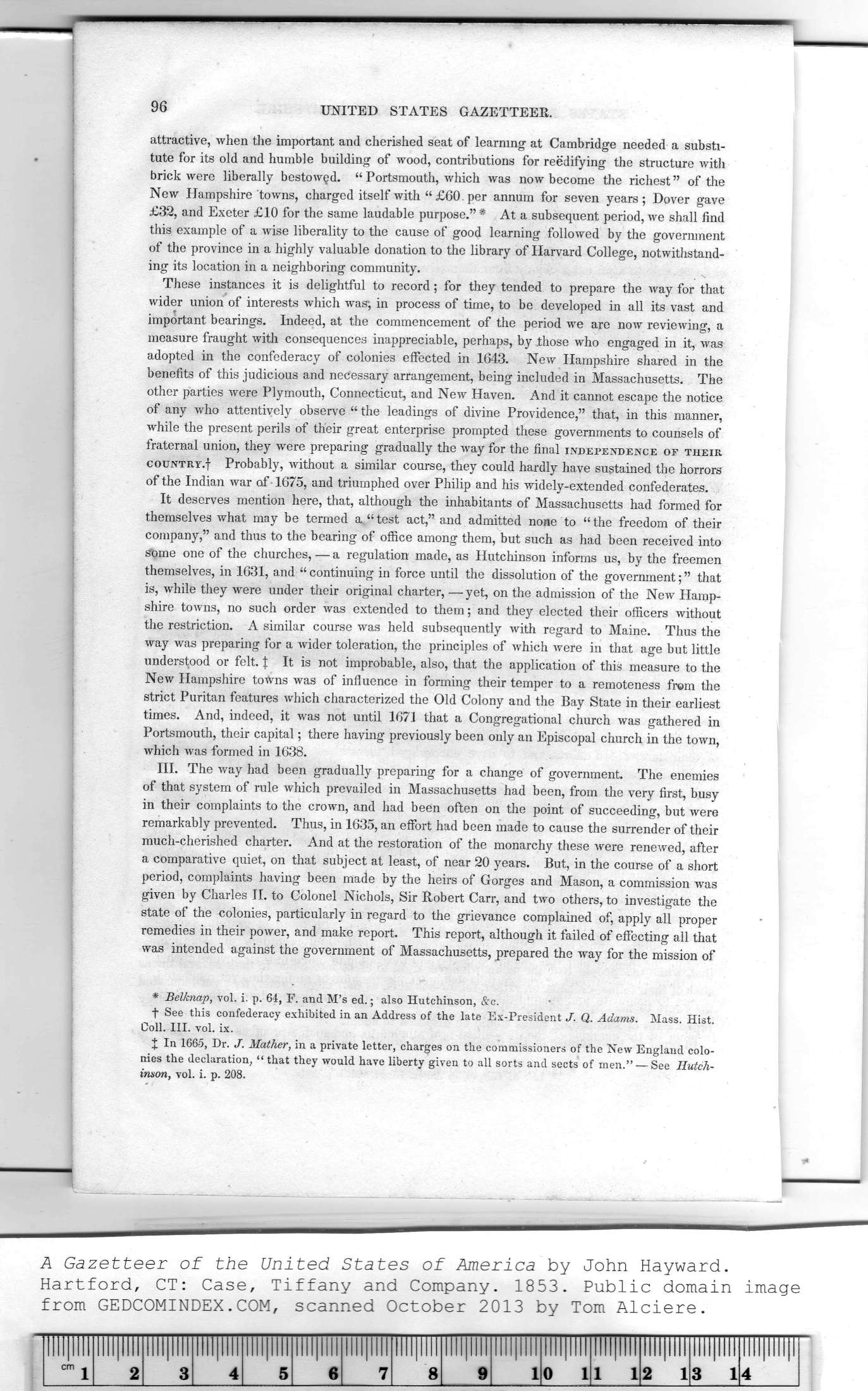|
|
Note: Ctrl and + increases the font size of the text below, Ctrl and - decreases it, and Ctrl and 0 resets it to default size.
96 UNITED STATES GAZETTEER.
attractive, when the important and cherished seat of learning at Cambridge needed a substi-
tute for its old and humble building of wood, contributions for reedifying the structure with
brick were liberally bestowed. “ Portsmouth, which was now become the richest " of the
New Hampshire towns, charged itself with “£60. per annum for seven years; Dover gave
£32, and Exeter £10 for the same laudable purpose." 1 At a subsequent period, we shall find
this example of a wise liberality to the cause of good learning followed by the government
of the province in a highly valuable donation to the library of Harvard College, notwithstand-
ing its location in a neighboring community.
These instances it is delightful to record; for they tended to prepare the way for that
wider union of interests which was, in process of time, to be developed in all its vast and
important bearings. Indeed, at the commencement of the period we are now reviewing, a
measure fraught with consequences inappreciable, perhaps, by those who engaged in it, was
adopted in the confederacy of colonies effected in 1643. New Hampshire shared in the
benefits of this judicious and necessary arrangement, being included in Massachusetts. The
other parties were Plymouth, Connecticut, and New Haven. And it cannot escape the notice
of any who attentively observe “ the leadings of divine Providence," that, in this manner,
while the present perils of their great enterprise prompted these governments to counsels of
fraternal union, they were preparing gradually the way for the final independence of their
couNTRY.f Probably, without a similar course, they could hardly have sustained the horrors
of the Indian war of 1675, and triumphed over Philip and his widely-extended confederates.
It deserves mention here, that, although the inhabitants of Massachusetts had formed for
themselves what may be termed a “ test act," and admitted none to “ the freedom of their
company," and thus to the bearing of office among them, but such as had been received into
some one of the churches, — a regulation made, as Hutchinson informs us, by the freemen
themselves, in 1631, and “ continuing in force until the dissolution of the government; " that
is, while they were under their original charter, —yet, on the admission of the New Hamp-
shire towns, no such order was extended to them; and they elected their officers without
the restriction. A similar course was held subsequently with regard to Maine. Thus the
way was preparing for a wider toleration, the principles of which were in that age but little
understood or felt. % It is not improbable, also, that the application of this measure to the
New Hampshire to-fvns was of influence in forming their temper to a remoteness from the
strict Puritan features which characterized the Old Colony and the Bay State in their earliest
times. And, indeed, it was not until 1671 that a Congregational church was gathered in
Portsmouth, their capital; there having previously been only an Episcopal church in the town,
which was formed in 1638.
III. The way had been gradually preparing for a change of government. The enemies
of that system of rule which prevailed in Massachusetts had been, from the very first, busy
in their complaints to the crown, and had been often on the point of succeeding, but were
remarkably prevented. Thus, in 1635, an effort had been made to cause the surrender of their
much-cherished charter. And at the restoration of the monarchy these were renewed, after
a comparative quiet, on that subject at least, of near 20 years. But, in the course of a short
period, complaints having been made by the heirs of Gorges and Mason, a commission was
given by Charles II. to Colonel Nichols, Sir Robert Carr, and two others, to investigate the
state of the colonies, particularly in regard to the grievance complained of, apply all proper
remedies in their power, and make report. This report, although it failed of effecting all that
was intended against the government of Massachusetts, prepared the way for the mission of
A Gazetteer of the United States of America by John Hayward.
Hartford, CT: Case, Tiffany and Company. 1853. Public domain image
1
Belknap, vol. i. p. 64, F. and M's ed.; also Hutchinson, &c.
f See this confederacy exhibited in an Address of the late Ex-President J. Q. Adams. Mass. Hist.
Coll. III. vol. ix.
% In 1665, Dr. J. Mather, in a private letter, charges on the commissioners of the New England colo-
nies the declaration, “ that they would have liberty given to all sorts and sects of men." — See Hutch-
inson, vol. i. p. 208.
|
